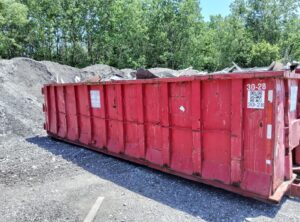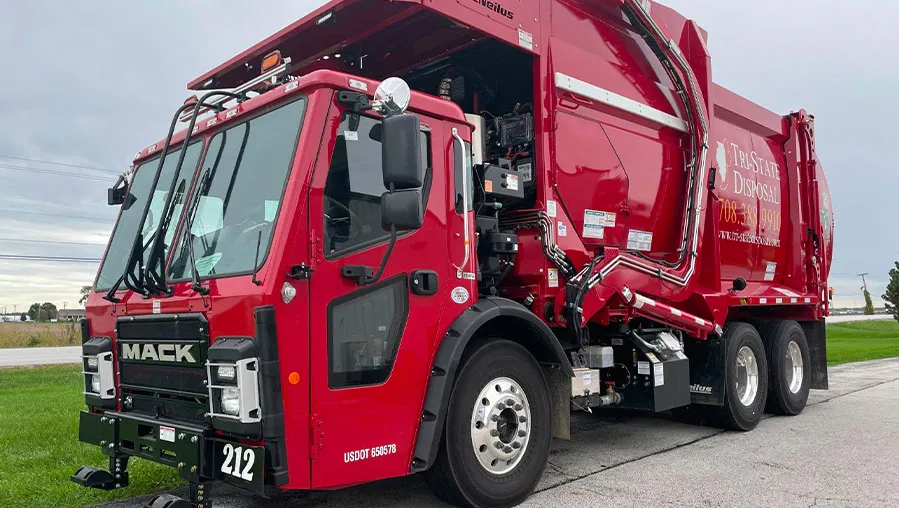Whether you rent dumpsters on a regular basis or plan to rent your first one soon, you should be aware of the most common problems people and businesses face when renting dumpsters.
Read on to learn about three common dumpster rental problems and how to avoid or solve them.
- Illegal Dumping
You likely carefully calculate the size of the dumpster you need for a certain job to ensure you have enough space to dispose of your items without exceeding the dumpster’s weight limit. However, you may feel like all of these calculations are futile when you arrive at your job site to find that others have deposited their trash in your dumpster without your permission.
In most cities, it is illegal to place trash in dumpsters located on private property, including in rental dumpsters, without the property owner’s permission. But that does not stop many people from dumping their trash illegally.
Thankfully, there are several ways to deter illegal dumping in your rental dumpster.
First, never be afraid to alert the local police and inform them of an illegal dumping incident, even if you do not know who is placing unwanted items in your dumpster. They may be able to increase police officer presence in the area to deter future illegal dumping or even find out who has been placing trash in your dumpster by examining the trash for identifying markings or checking any surveillance footage of the area that they may find.
Other ways to deter illegal dumping include placing your dumpster in a well-lit, fenced-in location or moving the dumpster closer to your business or home and away from the street. Also, keep dumpster lids closed when possible to increase the time it takes to place unwanted items inside. This extra time can help catch the illegal dumpers or deter dumpers who want to dump quickly without getting caught.
- Dumpster Overage Fees
Most, if not all, dumpster rental companies charge overage fees when customers over-fill dumpsters or fill them with items that exceed their weight limits. These fees help cover additional costs the company incurs due to this overfilling, such as extra landfill disposal fees or the cost of a second dumpster when the current one is so overfilled it cannot be transported legally or safely.
To avoid these fees, never fill your dumpster past its designated fill line. When you debate between two dumpster sizes, always choose the larger one. The extra cost of renting a slightly larger dumpster is typically less than a dumpster over-fill fee or the cost of renting an additional dumpster later when you realize you need more dumpster space.
Also, when you choose your rental dumpster, check the description to determine what building materials the rental company has determined the dumpster can hold without exceeding its weight limit. Dumpster rental companies often offer special dumpsters designated for the disposal of bricks, concrete, dirt, and other very heavy materials, and others meant for lighter-weight materials and debris to help customers stay under dumpster weight limits.
Finally, always cover your rental dumpsters with thick tarps when rain is forecasted. A dumpster full of wet debris will weigh much more than one filled with dry materials, which makes it easier to exceed dumpster weight limits.
- Hazardous Waste
Hazardous waste is never permitted to be disposed of alongside ordinary trash and debris, which means it should never be disposed of in a rental dumpster. For this reason, you should know what trash items are considered hazardous waste.
The Environmental Protection Agency (EPA) considers an item hazardous waste if it falls into one of four categories:
- Flammable. Flammable hazardous waste can catch fire at temperatures below 140 degrees F. Nail polish remover, gasoline, car oil, and some garden fertilizers are considered just a few of the many flammable hazardous waste items.
- Toxic. Toxic hazardous waste can be toxic to people or the environment. Just a few of these items include antifreeze, medications, and compact fluorescent light bulbs.
- Corrosive. These materials are typically either extremely acidic or alkaline and can damage human skin or the environment. A few examples include household bleach, oven cleaner, and automobile batteries.
- Reactive. Reactive items are either explosive materials or compressed gasses, such as propane tanks and aerosol cans.
When you are unsure whether an item you want to dispose of is hazardous waste, research the item online or call your dumpster rental company to obtain this information.
If you do place hazardous waste in your dumpster, then your dumpster rental company may charge you an additional hazardous waste disposal fee or require removal of the waste before they haul off your dumpster. You must instead take these items to a local hazardous waste disposal facility or check to see if your dumpster rental company offers an additional hazardous waste disposal service.
Keep these three dumpster rental problems and solutions in mind when you choose, place, and fill your next rental dumpster. Contact Tri-State Disposal for all of your dumpster rental, waste disposal, and recycling needs today.



